Basic Grammer1
basic语言入门

BASIC语言入门一. BASIC语言简介1. 什么是BASIC语言BASIC是Beginner's All-purpose Symbolic Instruction Code 的缩写。
意即初学者通用符号指令代码。
它是一种国际通用的计算机高级语言。
一般认为它是从FORTRAN 中提炼、简化而来。
因此简单易学,BASIC 入门了,再学其它高级语言也就不难了。
2. BASIC语言的版本电脑语言一般都有版本序列。
BASIC 语言也经历了不断的发展与改进,形成了不同环境下的不同版本。
如BASIC、BASICA、F-BASIC 、H-BASIC、Q-BASIC等等。
但一般来说都大同小异、基本的东西不变、较高版本兼容较低版本。
所以需恐慌与诧异。
让我们从最基本的也就是BASIC来学起,先入门,有兴趣的同学,就可以通过自学深入和提高。
3. BASIC语言的特点(1)简单易学。
基本BASIC的语句一共只有17种,且使用准英语或者叫类英语,表达式与运算符号也与数学中使用的差不多。
(2)会话功能。
BASIC是高级语言,具有很强的会话功能。
语句、表达式及运行到某句出错时,电脑会进行人机对话,及时给出提示等。
因此可以边做边改。
直至正确与满意为止,这一点对初学者十分方便。
(3)环境特点。
BASIC程序的运行分解释型与编译型两种。
一般在学习与编制程序时使用解释型环境。
也就是说要在DOS下先运行BASIC.EXE文件,进入BASIC的解释环境状态(其提示符是OK),编写程序所形成的文件其扩展名约定为BAS。
这就叫BASIC的源程序。
当源程序调试好了,反复运行都满意,可以用BASIC 的编译工具软件把它编译成扩展名为EXE的文件便能直接在DOS下运行。
有关BASIC的启动知识,可参阅课本第一章第四节(18~26页)4. BASIC的功能一般来说,BASIC具有运算、作图、音乐等三种基本功能。
它作数学运算时比其它语言要简单明了。
1 句子成分+5种基本句型

√
⑤ Some of the students in the school want to go √ swimming, how about you?
挑出下列句中的表语
① The old man was feeling very tired. A B C D √ ② Why is he worried about Jim? A B C D √ ③ The leaves have turned yellow. A B C D √ ④ Soon They all became interested in the subject. A B C D √ ⑤ She was the first to learn about it. A B C D √
4. 宾语 (Object)
宾语是动作、行为的对象,由名词、代词、不定式或相当于名词 的词、短语来担任,它和及物动词一起说明主语做什么,在谓语 之后。(直接宾语、间接宾语详见后面五种基本句型)。 She is playing the piano now.(名词作宾语) 她正在弹钢琴。 He often helps me.(代词作宾语) 他常常帮助我。 He likes to sleep in the open air.(不定式作宾语) 他喜欢在露天睡觉。 We enjoy living in China.(动名词作宾语) 我们高兴住在中国。
5. 状语 (Adverbial)
状语用来修饰动词、形容词或副词。一般表示行为发生的时间、 地点、目的、方式、程度等意义,一般由副词、介词短语、不定 式或相当于副词的词或短语来表示。状语一般放在句末,但有的 可以放在句首、句中。(详见副词) He did it carefully.(副词作状语) 他仔细、认真地做这项工作。 Without his help,we couldn't work it out. (介词短语作状语) 如果没有他的帮助,我们不可能解决这个问题。 (In order) to catch up with my classmates, I must study har (不定式作目的状语) 为了赶上我的同学,我必须努力学习。
必修一 Unit 1 Grammar-句子成分及基本句子结构
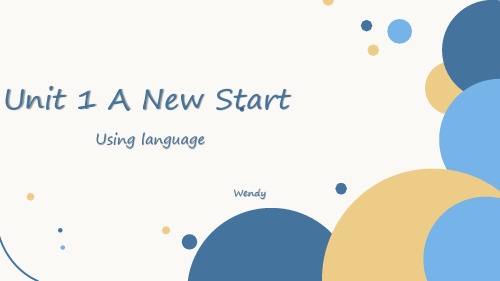
➢ e.g.
I will watch the movie.
He borrowed my key.
Time flies.
He can play basketball.
She quickly filled in the form.
句子成分
Unit 1 A new start Using language
句子成分
Unit 1 A new start Using language
表语或主语补足语 Subject complement
➢ 表语或主语补足语是接在联系动词(linking verb)之后的,用于补充说明主语所 处的状态的成分,一般由名词或形容词充当,整个句子构成所谓的“主系表”结构。 联系动词除了可以用be动词(am, is, are)构成之外,还可以用感官动词(smell, feel, taste…)充当。
c
4. I breathed deeply.
f
5. I looked at them in panic. g
6. I was embarrassed
a
7. His words made me a lot more relaxed! b
a He was friendly. b The exam made me quite nervous. c I passed him a book. d She agreed. e He wrote a long letter. f He talked loudly. g She looked after her sister patiently.
小试牛刀
造句练习
Unit 1 A new start Using language
英语语法 Basic GrammarⅠ词性
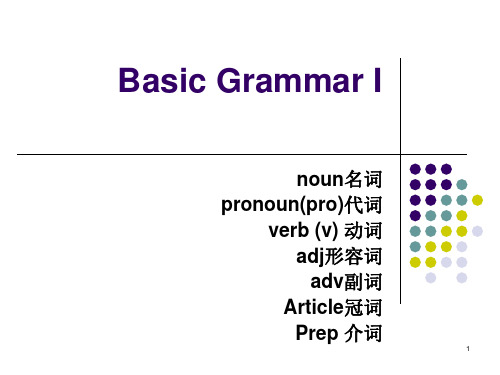
Quietly V
11
Find out the adv副词 II
He runs fast. fast She smiles happily. Happily
He shouts angrily. angrily
He hits it heavily. heavily
12
Find out the prep 介词
15
11. Don’t move the chair. ___它的 legs are broken. 12. Lily is ____ 我们的tutors. She teaches ___我们 English. ___我们 like ___她 so much. 13. I am right. _____你们 are wrong. 14. Where are ___你 from? I don’t know ___你。 15. ____他们 are on B level. We don’t take the same classes with _____他们。 _____他们的 classes are harder than ___我们的 classes.
and on
in
under
13
Find out the article冠词
a the
an
our
14
Exercise(pro)
代词练习 1. ___ 我don’t like ___ 我的 coat. 2. A: Where is the toilet? B: Follow ___跟我来. 3. ____你 don’t understand ____我。 4. I don’t know ____你。 5. A: Is this _______你的 book? B:No, it’s ____她的book. 6. Who is ____他? 7. Do you like _____他? 8. That’s _____他的 pen. 9. ____她is my girl friend. I love ____她very much. This is ____她的photo. 10. _____ 它is my pen. Give ___它 to me.
大学英语综合教程1UNIT
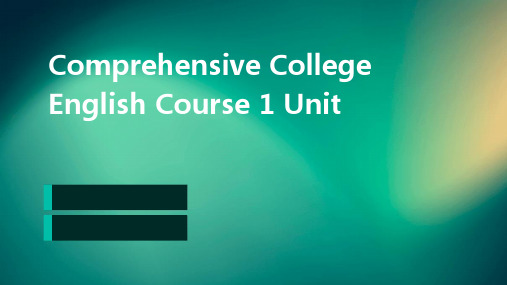
True/False Statements
Students listen to a recording and decide whether a given statement is true or false.
Analysis of Listening Materials
Identifying the main idea
• Retrieving specific information: The ability to quickly and accurately identify and retrieve specific information from a given audio material, such as names, dates, or numbers.
Unit 2
Listening and Speaking Skills: 本单元将重点培养学生的英语听说技能。学生将通过听录音、看视频等方式练习听 力和口语表达,提高英语交际能力。
Unit 3
Reading and Writing Skills: 本单元将重点培养学生的英语阅读和写作技能。学生将通过阅读英文文章、 写英文短文等方式练习阅读和写作能力,提高英语书面表达能力。
Comprehensive College English Course 1 Unit
目录
• Course Introduction • Listening comprehension • reading comprehension • Oral expression • Writing skills • Cultural background knowledge
Gapfill Exercises
Provide gapfill exercises where students fill in missing information based on the text.
必修一英语ppt课件

Nouns ending in - s, - x, - z, - ch, - sh, add - es at the end, for example: class >classes, box ->boxes
Rule 3
For nouns that end with a consonant+y, first change y to i and then add - es, such as: city ->cities
Vocabulary
Expand vocabulary through regular reading and note taking, and choose precision and aptwords to convey ideas
Paragraph organization
Unity
Ensure paragraphs are focused on a single topic or idea, and all senses support
01 Unit 1: Basic Grammar Knowledge
CHAPTER
The Plural Form of Nouns
Rule 1
Rule 2
Most nouns add - s or - es at the end, such as: dog ->dogs, box ->boxes
Inference and production
Drawing inferences and productions based on the given information, and making rational guides about unstated information
大学英语语法1——主语谓语

• Subjects are nouns and other forms that can function as nouns, such as pronouns, clauses, infinitives and gerunds. A subject usually comes first in a sentence. It is the topic about which the speaker or writer is speaking or writing. For example,
A noun, a pronoun or an adjective that follows a linking verb is called a predictive, which points back to the subject to rename it, to identify it or to describe it further.
• George must be playing basketball with them now.
• The thief has been caught in a deserted building.
Auxiliary /helping verbs can not be used alone in a sentence. It must go together with main verbs. Correct the following sentences:
七年级英语第一月考知识点
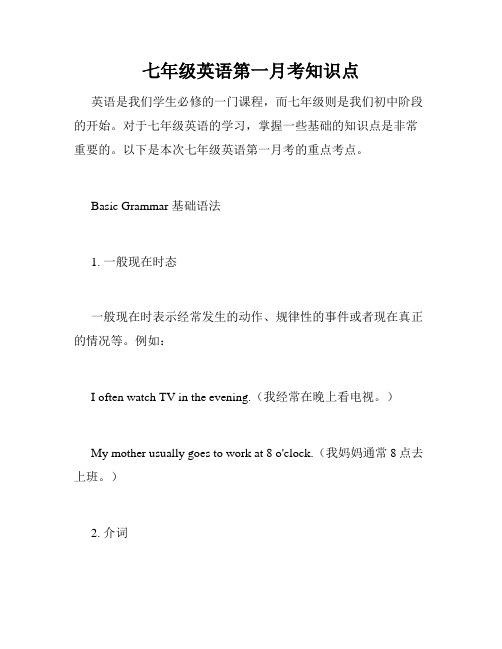
七年级英语第一月考知识点英语是我们学生必修的一门课程,而七年级则是我们初中阶段的开始。
对于七年级英语的学习,掌握一些基础的知识点是非常重要的。
以下是本次七年级英语第一月考的重点考点。
Basic Grammar 基础语法1. 一般现在时态一般现在时表示经常发生的动作、规律性的事件或者现在真正的情况等。
例如:I often watch TV in the evening.(我经常在晚上看电视。
)My mother usually goes to work at 8 o'clock.(我妈妈通常8点去上班。
)2. 介词介词是英语中非常重要的一个语法部分。
介词主要用于表达时间、地点、方向、目的等。
常见介词有:in、on、at、to等。
例如:We will have a party at home on Sunday.(我们将在星期天在家里开个派对。
)Please give this book to Tom.(请把这本书给汤姆。
)3. 疑问词疑问词是询问人、事、地点、时间、原因等方面的词汇。
常见的疑问词有:what、where、when、who等。
例如:What is your name?(你叫什么名字?)Where do you live?(你住在哪里?)Reading 阅读1. 阅读理解阅读理解是英语学习中很重要的一环。
在阅读理解中,需要理解文章内容,并回答相关问题。
需要注意的是,回答问题的答案必须从文章中找到相关的依据。
2. 语法填空语法填空是一种需要考生在一段文字中根据文意和语法知识来完善语句的题目形式。
考生需要根据上下文和语法知识,填入正确的词语或形式。
Listening 听力1. 短对话短对话是英语听力考试中比较基础的考点。
听力材料中会出现两个人之间的问答形式,考生需要听取问题和答案,理解其含义。
2. 短文听力短文听力需要考生在听完一段短文后,回答相关问题。
在短文听力中,考生需要注意语音语调、速度等问题。
grammar语法

不规则变化
4)以s结尾,仍为单数的名词,如: a. maths,politics,physics等学科名词,为不可数名词,是单 数。 b. news 是不可数名词。 c. the United States,the United Nations 应视为单数。 The United Nations was organized in 1945. 联合国是 1945年组建起来的。 d. 以复数形式出现的书名,剧名,报纸,杂志名,也可视为单数。 "The Arabian Nights" is a very interesting story-book. <<一千零一夜>>是一本非常有趣的故事书。
1.3不可数名词量的变化
物质名词 a. 当物质名词转化为个体名词时。 比较: Cake is a kind of food. 蛋糕是一种食物。 (不可数) These cakes are sweet. 这些蛋糕很好吃。 (可数) b. 当物质名词表示该物质的种类时,名词可数。 This factory produces steel. (不可数) We need various steels. (可数) c. 当物质名词表示份数时,可数。 Our country is famous for tea. 我国因茶叶而闻名。 Two teas, please. 请来两杯茶。
3) 有些原有s结尾的名词,作定语时,s保留。 如:goods train (货车) arms produce 武器生产 customs papers 海关文件 clothes brush衣刷 4) 数词+名词作定语时,这个名词一般保留单数形式。 如:two-dozen eggs 两打/(二十四个鸡蛋) a ten-mile walk 十里路 two-hundred trees 两百棵树 a five-year plan 一个五年计划
英文文法基本规则
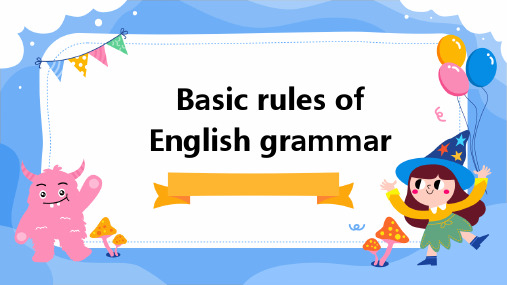
Transitional verbs can have direct and indirect objects The direct object is the person or thing that receives the action directly, while the indirect object is the person or thing that benefits from the action indirectly
02
Used for commands or requests
Sub functional mood
03
Used for wishes, hypotheses, or conditions
contemporary to fact
04
Objective and Advisory Rules
Usage and Position of Adjective
condition of the subject
The subject and predicate must be in agreement in terms of number (singular or plural) and person (first,
second, or third)
The selection and use of objects
Positions often show the relationship between the subject and the object, or between the object and another part of the sentence
grammar 1 basic sentence patterns
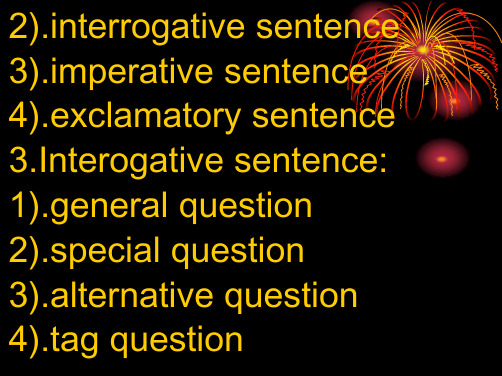
14).He was talking to his father when I saw him. 15).These workers all live near their factory. 16).The People’s Republic of China was founded on October1,1949. 17).Mr.Liang is always encouraging us to speak English both in and out of class.
Basic Sentence Patterns
Ⅰ.classification of sentences: 1.structure: 1).simple sentences 2).compound sentences 3).complex sentences es: 1).declarative sentence
1).A simple declarative sentence can be changed into all kinds of sentences. 2).You can join two simple sentences together through “and, but, ; or, for ” and get a compound sentence:
13).Mary knows something about it,____? 14).He stayed at home yesterday,____? 15).She seldom goes out on weekends,____? 16).Everyone likes to live a happy life,____? 17).I don’t believe that he has failed the English exam,____?
高中英语一轮课件第二部分基础语法九种成分

Concept
An object is a noun or pronoun that receives the action described by the verb in a sentence. It can also be a person or thing that is affected by the action.
The Principle of Subject verb Consistency and Its
AppExalmicplaestionof
subject-verb agreement
They
(plural
subject) are (plural
verb)
having
dinner together.
structure • Omitting structure and parallel
structure • Summary, Review, and Extension
01 Overview of Nine Ingredients
Definition and classification
Definition
Principle
The principle of subject-verb consistency states that the subject and verb must agree in number. This means that a singular subject requires a singular verb, and a plural subject requires a plural verb.
He subject) (singular tennis Sunday.
大学英语第一课详解
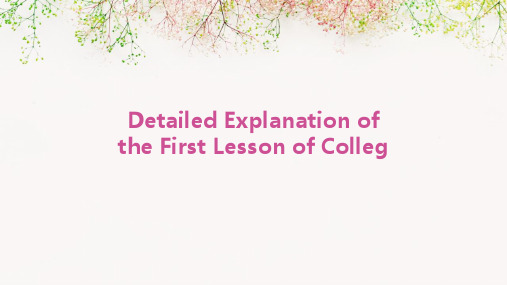
Writing skills
Listening and speaking
Practice listening comprehension and fluent speaking in different contexts
Course content
Theory and practice
Integrate theory and practical exercises to enhance learning outcomes
Pronunciation correction
03
02
01
04
English writing exercises
Paragraph development
The ability to organize ideas into coherent paragraphs is critical for effective writing Paragraphs should have a clear topic presence, supporting presence, and a conclusion presence that ties everything together
Vocabulary usage
A rich vocabulary can enhance written expression It is important to choose precise words that consider meaning effectively
全国英语等级考试第一级教程

The primary objective of NEPT Level 1 is to evaluate the test taker's basic English proficiency, including listening, speaking, reading, and writing skills
It is widely recognized and used for various purposes such as academic admissions, job applications, and immigration
The test is divided into different levels, with Level 1 being the entry level examination
• Vocabulary: A rich vocabulary allows for more precision and express communication Expand your vocabulary by reading broadly and actively learning new words and phrases
Analysis and Practice of Listening Sample
Questions
01
Sample question 1
Multiple choice question Listen to a conversation between two people and choose the correct answer based on what you hear
02
Sample question 2
新概念英语第一册ppt课件
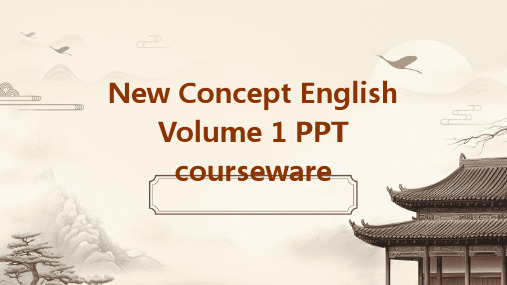
the story.
02
Summarizing
Summarizing the main points and ideas from a text. This helห้องสมุดไป่ตู้s
students understand the overall structure and content of the
text.
03
Vocabulary extension
词汇扩展是提高学生英语水平的重 要途径,PPT课程中应包含更多高级 词汇和学科专业词汇。
VS
随着学生英语水平的提高,他们需要 掌握更多高级词汇和学科专业词汇, 以便能够更准确地表达自己的意思。 PPT课程中应提供有效的词汇扩展方 法,如词根、词缀、同义词等,以便 学生能够快速增加自己的词汇量。同 时,PPT课程中还可以通过例句和练 习来帮助学生更好地理解和运用这些 高级词汇和学科专业词汇。
Note-taking skills
The ability to quickly and effectively record important information during a listening passage, using techniques such as abbreviation and概括.
Teacher provides explanations and examples to illustrate new concepts.
Independent study
Assigned readings, homework, and selfstudy materials to reinforce learning.
02
了解英语发音规则是提高英语发 音准确性的关键,通过学习发音 规则,可以更好地掌握英语发音 的技巧和方法,避免发音错误。
英文英语说课ppt课件
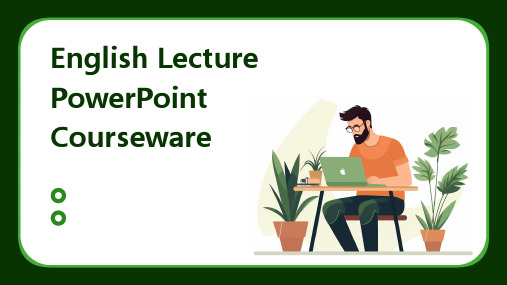
Reading and writing teaching is a very important part of English teaching, which involves cultivating students' reading and writing abilities.
CHAPTER
Grammar teaching is a very important part of English teaching, which involves teaching language rules and structures.
In grammar teaching, teachers usually explain grammar rules and provide sufficient practice to help students master these rules. In addition, teachers will also teach students how to analyze sentence structures to improve their reading and writing abilities.
English Lecture PowerPoint CoursewareΒιβλιοθήκη CATALOGUE目录
Course IntroductionTeaching contentTeaching strategiesCourse implementationCourse effectiveness
CHAPTER
01
02
03
04
In depth explanations of grammar, vocabulary, reading, and writing skills
英语必修一复习资料
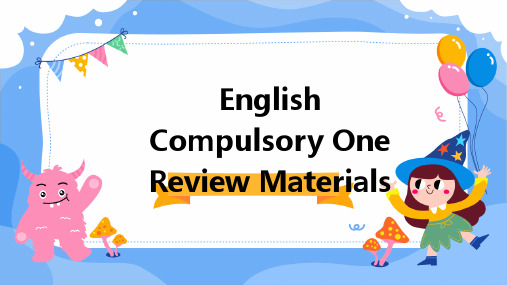
coordinating connections
Interjections
expressions of emotion or surprise
Summary of Common Phrases
Greetings and farewells
"Hello", "Good morning", "Goodbye", "See you later"
Master the basic grammar rules and structures of the English language
Improve listening and speaking skills to communicate effectively in English
Assessment methods and standards
Writing Skills
Students will develop their writing abilities by learning how to construct clear and coherent intentions and paragraphs, as well as how to write different types of essays
used to describe hats, general truths, and fixed arrangements
Present Continuous Tense
used to describe actions happening now or in the near future
七年级英语1到6课的作文范文综合训练

七年级英语1到6课的作文范文综合训练全文共3篇示例,供读者参考篇1Seventh Grade English Comprehensive TrainingIn the first six lessons of seventh grade English, students are introduced to various aspects of the language such as grammar, vocabulary, reading comprehension, writing skills, and listening exercises. This comprehensive training aims to help students build a strong foundation in English and develop their language proficiency. In this article, we will review the key topics covered in these lessons and provide strategies for students to excel in their English studies.Lesson 1: Basic GrammarThe first lesson focuses on basic grammar rules such as the parts of speech, sentence structure, and tenses. Students learn how to identify nouns, verbs, adjectives, and adverbs in sentences, as well as how to form simple present, past, and future tenses. To practice these concepts, students can create their own sentences using different parts of speech and tenses.Lesson 2: Vocabulary BuildingIn the second lesson, students expand their vocabulary by learning new words and phrases related to common topics such as family, school, hobbies, and daily routines. To enhance their vocabulary skills, students can practice using flashcards, reading English books, and watching English movies with subtitles.Lesson 3: Reading ComprehensionThe third lesson focuses on improving reading comprehension skills by teaching students how to identify main ideas, details, and supporting evidence in texts. Students practice reading passages and answering questions to demonstrate their understanding of the material. To enhance their reading comprehension skills, students can engage in daily reading activities such as reading newspapers, magazines, and online articles.Lesson 4: Writing SkillsIn the fourth lesson, students learn how to constructwell-organized paragraphs and essays by following the appropriate structure and using cohesive devices. Students practice writing descriptive, narrative, and argumentative essays to improve their writing skills. To enhance their writing abilities, students can participate in writing contests, journaling, and peer-editing exercises.Lesson 5: Listening ExercisesThe fifth lesson focuses on developing listening skills by engaging students in various listening activities such as listening to conversations, lectures, and interviews. Students practice listening for main ideas, details, and specific information to improve their listening comprehension. To enhance their listening skills, students can listen to English podcasts, audiobooks, and music lyrics.Lesson 6: Speaking PracticeIn the sixth lesson, students practice speaking English by engaging in oral presentations, dialogues, and discussions. Students learn how to express their opinions, ask questions, and participate in conversations with confidence. To improve their speaking skills, students can practice speaking English with native speakers, participate in English clubs, and attend language exchange events.By mastering the key topics covered in the first six lessons of seventh grade English, students can build a strong foundation in English and develop their language proficiency. With regular practice and dedication, students can excel in their English studies and become confident English speakers.篇2Seventh Grade English Comprehensive Writing TrainingIn the first six lessons of seventh grade English, we have covered a wide range of topics that provide a solid foundation for our language skills. From grammar rules to vocabulary building, reading comprehension to writing exercises, each lesson has been designed to enhance our proficiency in the English language. In this write-up, I will reflect on the key takeaways from these lessons and provide a comprehensive analysis of my learning experience.Lesson 1 focused on basic grammar rules, including parts of speech, sentence structure, and verb tenses. By understanding these fundamental concepts, I was able to improve my writing skills and communicate more effectively in English. Lesson 2 introduced us to a variety of vocabulary words and phrases, helping us expand our word bank and improve our reading comprehension skills. Lesson 3 delved into the art of writing, teaching us how to structure essays, use transition words, and develop cohesive arguments.Lessons 4 and 5 focused on reading comprehension, where we analyzed texts, answered questions, and discussed themesand characters. These exercises helped us develop critical thinking skills and improve our understanding of written English. Finally, in Lesson 6, we practiced writing narratives, descriptive essays, and persuasive pieces. This lesson allowed us to showcase our creativity and hone our persuasive language skills.Overall, the first six lessons of seventh grade English have provided me with a solid foundation in grammar, vocabulary, reading comprehension, and writing. I have learned how to structure sentences, expand my word bank, analyze texts, and write compelling essays. Moving forward, I hope to continue building on these skills and further improve my proficiency in the English language.In conclusion, the comprehensive training provided in the first six lessons of seventh grade English has been invaluable in improving my language skills. I look forward to applying what I have learned in future lessons and continuing to grow as a proficient English speaker and writer.篇3Seventh Grade English Comprehensive Writing TrainingIn the first six lessons of seventh-grade English, we have covered a variety of topics ranging from grammar andvocabulary to reading comprehension and writing. Through these lessons, we have gained a solid foundation in the English language that will serve us well in our future studies and beyond.In the first lesson, we learned about basic grammar concepts such as subject-verb agreement, tenses, and parts of speech. This lesson was essential in helping us understand how to construct correct sentences and communicate effectively in English.In the second lesson, we focused on expanding our vocabulary through the study of synonyms, antonyms, and word roots. Building a strong vocabulary is crucial in order to express ourselves clearly and accurately in writing and speaking.The third lesson introduced us to the important skill of reading comprehension. We learned how to effectively read and analyze texts, and how to identify main ideas, supporting details, and inferences. This skill will be beneficial not only in our English class but also in other subjects and in our everyday lives.In the fourth lesson, we practiced our writing skills by crafting descriptive paragraphs and narratives. We learned how to use descriptive language to paint vivid pictures in the minds of our readers, and how to structure our writing in a clear and coherent manner.The fifth lesson focused on persuasive writing, where we learned how to make strong arguments and support them with evidence and examples. Persuasive writing is a valuable skill that can help us communicate our opinions and ideas effectively in various situations.In the sixth lesson, we delved into the world of poetry and studied different forms and techniques. Writing poetry allows us to express our emotions and thoughts in a creative and artistic way, and it enhances our ability to play with language and create imagery.Overall, the first six lessons of seventh-grade English have provided us with a comprehensive training in various aspects of the English language. By mastering grammar, expanding our vocabulary, honing our reading comprehension skills, and practicing different types of writing, we have developed a strong foundation in English that will benefit us in our academic and personal lives. We look forward to continuing our English studies and further enhancing our language proficiency in the future.。
中职英语基础模块1修订版教学计划
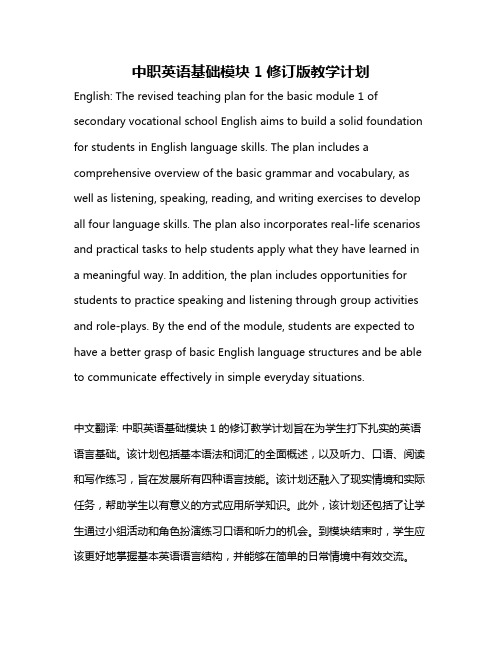
中职英语基础模块1修订版教学计划English: The revised teaching plan for the basic module 1 of secondary vocational school English aims to build a solid foundation for students in English language skills. The plan includes a comprehensive overview of the basic grammar and vocabulary, as well as listening, speaking, reading, and writing exercises to develop all four language skills. The plan also incorporates real-life scenarios and practical tasks to help students apply what they have learned in a meaningful way. In addition, the plan includes opportunities for students to practice speaking and listening through group activities and role-plays. By the end of the module, students are expected to have a better grasp of basic English language structures and be able to communicate effectively in simple everyday situations.中文翻译: 中职英语基础模块1的修订教学计划旨在为学生打下扎实的英语语言基础。
新视野英语教程 第四版 读写教程1_教学大纲

《新视野英语教程读写教程1》课程教学大纲课程名称(中文):职场通用英语1/综合英语1/基础英语1/英语读写1课程性质:公共基础课适用专业:高职各专业学时数:64-80(根据学校实际情况机动安排)考核方式:考试(40%平时成绩,60%期末成绩)先修课程:《高中英语》后续课程:《新视野英语教程读写教程2》1.课程简介《职场通用英语》为高职各专业学生必修的英语公共基础课。
本课程以教育部《高等职业教育专科英语课程标准(2021年版)》为依据,以全面贯彻党的教育方针,培育和践行社会主义核心价值观,落实立德树人为根本任务。
以中等职业学校和普通高中的英语课程为基础,与本科教育阶段的英语课程相衔接,本课程旨在培养学生学习英语和应用英语的能力,为学生未来继续学习和终身发展奠定良好的英语基础;进一步促进学生英语学科核心素养的发展,培养具有中国情怀、国际视野,能够在日常生活和职场中用英语进行有效沟通的高素质技术技能人才;增强各专业学生运用英语服务本专业学习的能力,以适应个人成长、社会发展、经济建设和国际交流的需要。
2.教学目的《职场通用英语1》是学生由高中英语学习向大学英语学习的过渡与衔接。
本学期本课程的教学目的是帮助学生进一步巩固高中所学的英语语言知识和语法知识,巩固并习得新的词汇、语法及句子结构,并在读、写、译等各项语言活动中温故而知新;帮助学生适应大学英语课堂教学,掌握合适的学习方法,明确学习目标,为以后的学习夯实基础。
通过本课程及后续课程的学习,学生应该能够达到课程标准所设定的职场涉外沟通、多元文化交流、语言思维提升、自主学习完善等四项学科核心素养的发展目标。
3.培养目标知识:巩固和延伸所学的英语知识(词汇、语法、翻译等),要求学生通过一个学期的学习,梳理自己的英语知识系统,找到自己的学习方法和努力方向,并将所学知识有意识地应用。
能力:培养和发展学生用英语进行读、写、译的能力和情境交流能力,促进其沟通能力、分析问题与解决问题的能力、跨文化理解与表达能力、思辨能力的提升。
- 1、下载文档前请自行甄别文档内容的完整性,平台不提供额外的编辑、内容补充、找答案等附加服务。
- 2、"仅部分预览"的文档,不可在线预览部分如存在完整性等问题,可反馈申请退款(可完整预览的文档不适用该条件!)。
- 3、如文档侵犯您的权益,请联系客服反馈,我们会尽快为您处理(人工客服工作时间:9:00-18:30)。
Grammar- Articles: A, An, The- When to use?
In English, knowing when to use 'a' or…an‟ or 'the' can be difficult. Fortunately, there are rules to help you, but you need to know what type of noun you are using.
Grammar rule 1
When you have a single, countable English noun, you must always have an article before it. We cannot say "please pass me pen", we must say "please pass me the pen" or "please pass me a pen" or "please pass me your pen".
Nouns in English can also be uncountable. Uncountable nouns can be concepts, such as 'life', 'happiness' and so on, or materials and substances, such as 'coffee', or
'wood'.
当你有一个单一的,可数的英语名词,你必须总是有它的前一篇文章。
我们不能说“请把我的钢笔”,我们必须说“请把我的笔”或“请递给我一支笔”或“请递给我你的笔”。
英语名词也可以是不可数的。
不可数名词的概念,如“生命”,“幸福”等,材料和物质,如'咖啡',或'木头'。
Grammar rule 2
Uncountable nouns don't use 'a' or 'an'. This is because you can't count them. For example, advice is an uncountable noun. You can't say "he gave me an advice", but you can say "he gave me some advice", or "he gave me a piece of advice".
Some nouns can be both countable and uncountable. For example, we say "coffee" meaning the product, but we say "a coffee" when asking for one cup of coffee.
语法规则2
不可数名词不使用'a'或'一'。
这是因为你不能指望他们。
例如,意见是不可数名词。
你不能说“他给了我一个建议”,但你能说“他给了我一些建议”,或“他给了我一个忠告”。
有些既可以是可数和不可数名词。
例如,我们说“咖啡”,这意味着该产品,但我们说“咖啡”时,要求一杯咖啡。
Grammar rule 3
You can use 'the' to make general things specific. You can use 'the' with any type of noun – plural or singular, countable or uncountable.
"Please pass me a pen" – any pen.
"Please pass me the pen" – the one that we can both see.
"Children grow up quickly" – children in general.
"The children I know grow up quickly" – not all children, just the ones I know. "Poetry can be beautiful"- poetry in general.
"The poetry of Hopkins is beautiful" – I'm only talking about the poetry Hopkins wrote. 语法规则3
您可以使用“the‟一般的东西,具体的。
您可以使用“the”任何类型的名词- 单复
数,可数或不可数。
“请递给我一支笔” - 任何笔。
“请把我的笔” - 我们都可以看到。
“孩子们快快长大” - 儿童一般。
“我知道孩子们长大后迅速” - 不是所有的孩子,只是我知道的。
“诗可以是美丽的” - 诗一般。
“霍普金斯的诗是美丽的” - 我只谈论诗歌霍普金斯写道。
More uses of articles in English多种用途的英语文章
Rivers, mountain ranges, seas, oceans and geographic areas all use 'the'.
For example, "The Thames", "The Alps", "The Atlantic Ocean", "The Middle East".
Unique things have 'the'.
For example, "the sun", "the moon".
Some institutional buildings don't have an article if you visit them for the reason these buildings exist. But if you go to the building for another reason, you must use 'the'.
"Her husband is in prison." (He's a prisoner.)
"She goes to the prison to see him once a month."
"My son is in school." (He's a student.)
"I'm going to the school to see the head master."
Musical instruments use 'the'.
"She plays the piano."
Sports don't have an article.
"He plays football."
Jobs use 'a'.
"I'm a teacher."
Countries
We don't use 'a' if the country is singular. "He lives in England." But if the country's name has a "plural" meaning, we use 'the'. "The People's Republic of China", "The United States of America".
Continents, towns and streets don't have an article.
"Africa", "New York", "Church Street。
